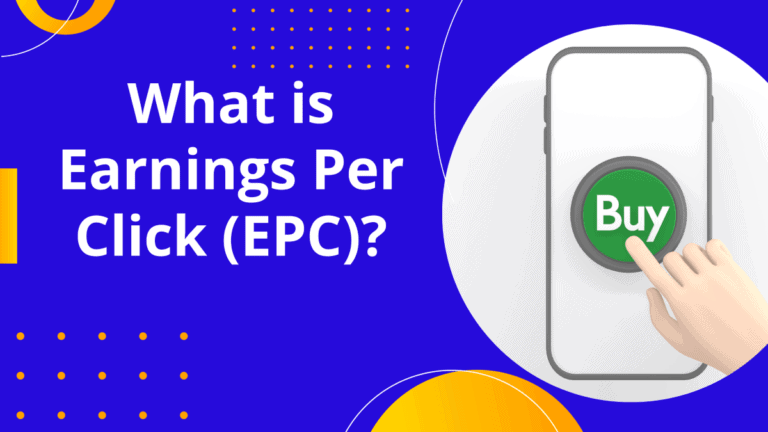
Hey there! Ever stumbled upon the chatter that affiliate marketing might just be some sneaky pyramid scheme? It’s a buzz that’s been going around, especially when folks are gabbing about making some cash online. So, let’s clear the air, shall we?
Here’s the lowdown: Affiliate marketing? It’s just some cool peeps (we call ’em affiliates) giving a big thumbs up to a company’s products and services. If someone snags that product using the affiliate’s special link, a bit of cash lands in their pocket.
But pyramid schemes?
That’s a whole other story. These schemes reel folks in with flashy dollar signs, but here’s the twist: it’s all about getting more people to join the party, not really about selling the real products.
So, the burning question: Is affiliate marketing a pyramid scheme?
In this post, I’ll help you understand what affiliate marketing is, details of its inner workings, and serve up some real-life examples.
Oh, and we’ll also spill on pyramid schemes, why they’re bad news, and the sticky spots to watch out for.
By the end, you’ll see the difference between affiliate marketing and pyramid schemes clearer than a summer’s day, helping you navigate the online cash-making maze.
So, ready to debunk some myths and get the real scoop on affiliate marketing and pyramid schemes? Let’s roll!
Understanding Affiliate Marketing
Affiliate marketing is a lively world where people and businesses grow together. It’s an easy yet powerful way to make money online by promoting products or services. At the core of this model is a win-win bond between the affiliate marketer and the company. It’s all about that mutual high-five between the affiliate marketer and the company. Everyone’s winning!

Definition
Let’s look at the formal definition of affiliate marketing –
Affiliate marketing is a type of performance-based marketing where an affiliate promotes a company’s products or services. If someone buys that promoted product or service using the affiliate link, then the affiliate gets a commission. It’s a clean and simple way of making money by promoting products. 100% legit!
How Affiliate Marketing Work?
Affiliate marketing is a type of marketing where you get paid to promote someone else’s products and services. Here are the main steps:
- You as an affiliate join the program of your choice. This can be an affiliate program of a business or an affiliate network which aggregates affiliate programs from many businesses.
- You choose your mode of promotion. In this business model, you can use any platform to promote products. You can do social media marketing, e-mail marketing, run paid ads or set up your website to talk about your favorite products.
- One key point to note is that you don’t have to sell products. You just have to give reviews about the products and use affiliate links in the content.
- Once someone decides to buy the product using your links, you get paid in commissions. These commissions are decided by the business whose products you are promoting.
That’s it. That is how you do affiliate marketing.
But if you want to know the secret sauce of becoming a successful affiliate marketer, then check out this guide. Here I have talked about strategies you can use to run successful affiliate marketing campaign.
Benefits of Affiliate Marketing
Affiliate marketing is like a gift that keeps on giving for both businesses and affiliate marketers. Let’s dive in and see what’s in the goodie bag:
For Businesses: When you start an affiliate marketing program, you get these awesome benefits –
- Budget-Friendly: Forget those pricey traditional ads. With affiliate marketing, you’re only shelling out cash when you see real sales or leads.
- Boost in Visitors and Buys: The affiliate partners drive more folks to your site, which usually means more sales. Cha-ching!
- Reaching Far and Wide: Affiliates can introduce you to customers in places you might’ve never thought of.
- SEO Magic: When affiliates talk about your products, they link to your website. These are free backlinks and they give your site a little boost in the search engine rankings.
- You Get What You Pay For: It’s all about performance. For every buck you spend, you get real results.
For Affiliate Marketers:
- Cash Flow: There’s no ceiling here. The more you hustle, the more you earnings you pocket.
- Your Schedule, Your Rules: Whether you’re a night owl or an early bird, work when you feel like it.
- Money While You Snooze: Nail your strategy, and you could earn passive income even during your Netflix binge sessions.
- Easy on the Wallet: Getting started in affiliate marketing? It doesn’t cost an arm and a leg.
- Your Office? Anywhere: Got Wi-Fi and a laptop? You’re good to go.
- Keep Learning: Dive into affiliate marketing, and you’ll pick up some cool digital marketing tricks, from SEO to social media shout outs.
Real-world Examples of Affiliate Networks & Programs
The online marketing world is full of thousands of legitimate affiliate marketing companies and networks which partner with millions of affiliates to increase sales of their products in a legal and legitimate way. Let’s checkout some of the more prominent examples:
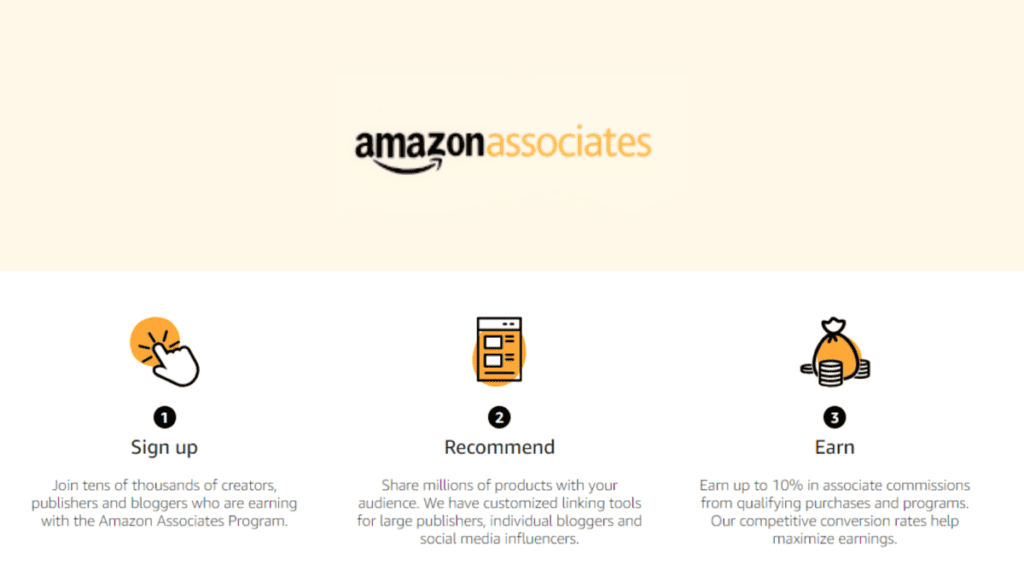
- The Amazon Affiliate Program is a shining example of successful affiliate marketing. Many affiliates have carved out a niche, promoting a myriad of products available on Amazon, and earning handsome commissions in return.
- Another notable mention is the ClickBank affiliate network, where affiliates promote digital products and earn attractive commissions. The success stories stemming from these platforms are testament to the lucrative nature of affiliate marketing when approached with knowledge and dedication.
- Some others include CJ Affiliate, ShareASale, Awin and Impact. All of these affiliate networks give you chance to do some legit high ticket affiliate marketing to start making money online.
Understanding Pyramid Schemes
Pyramid schemes are like the sketchy backstreets of the business world. They reel folks in with big money dreams. But unlike affiliate marketing, these setups are all smoke and mirrors, and in a lot of places, they’re straight-up illegal. Here’s what you need to know:
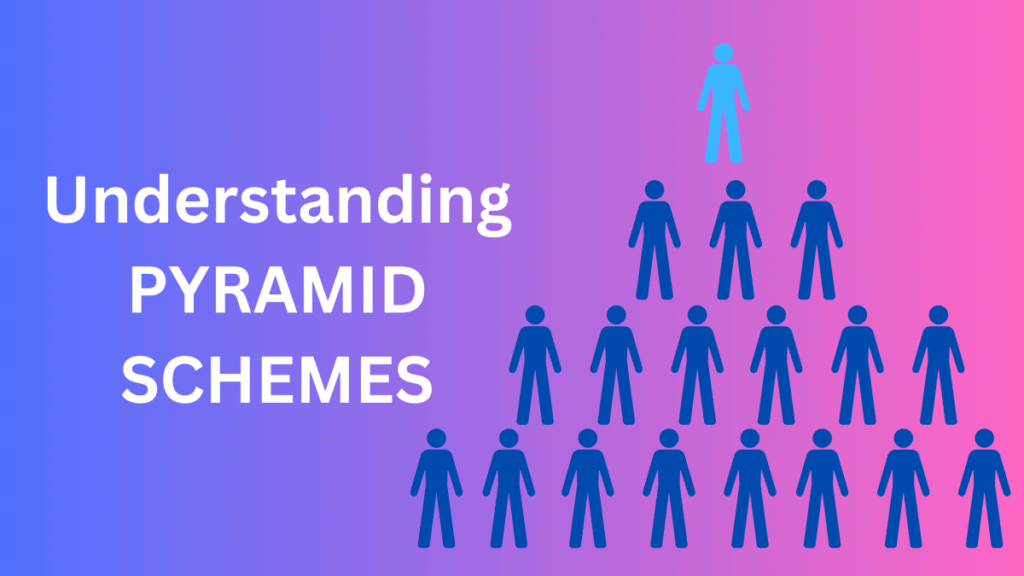
Definition
Pyramid schemes are a type of investment scam where each person involved recruits others to join. Money made by the new members goes up to the higher members. They flash big money promises, but there’s no real deal or product behind the scenes. It’s all a big scam.
How Pyramid Schemes Work?
Pyramid schemes can be tricky to spot because they wrap up deception in a shiny package. Let’s break it down step by step:
- Join the Club: People are lured into joining a program, often by putting in some cash. They’re dazzled with promises of big returns.
- The Promise: These new folks are told they’ll get a slice of the pie for every new person they bring on board.
- Building the Pyramid: As more people join, the structure grows, creating different layers. But here’s the catch: each layer needs way more people to keep the money flowing.
- The Bubble Bursts: At some point, getting new folks becomes a mission impossible. When the growth stalls, those at the bottom can’t get their money back, and everything falls apart.
- The Aftermath: Most people end up with empty pockets, while a lucky few at the top make off with the loot.
Now, pyramid schemes can sometimes look a lot like legit business models, like MLM (multi-level marketing). That’s why it’s super important to really dig in and tell the difference between shady deals and real business opportunities. These are sold as get-rich-quick scheme but it is a disaster for most folks who get involved.
Legal Ramifications
Running a pyramid scheme isn’t just bad news for your wallet; it’s a one-way ticket to legal hot water. Many countries have stamped pyramid schemes as illegal because they’re basically financial traps. If you’re caught running one, you could face hefty fines, and in some places, even a cozy jail cell might be waiting. Plus, think about the reputation hit! Once you’re labeled as the person behind a scam, good luck getting trust back. So, before diving into any “too good to be true” business opportunity, it’s wise to double-check its legitimacy. No one wants to swap business suits for prison stripes!
Real-World Examples
Remember Zeek Rewards and BurnLounge? These notorious names serve as stark reminders of the chaos pyramid schemes can cause. While they dangled the shiny carrot of “quick riches” in front of many, the reality was a financial nightmare for the majority who got involved. It’s always a good idea to learn from history and steer clear of anything that smells even remotely fishy.
Key Differences Between Affiliate Marketing and Pyramid Schemes
For those new to the game, affiliate marketing and pyramid schemes might seem like they’re cut from the same cloth. You might also hear that affiliate marketing is a pyramid scheme.
Nothing can be far from truth!
Let’s dive into the unique characteristics of the two types of business models and clear up any confusion:
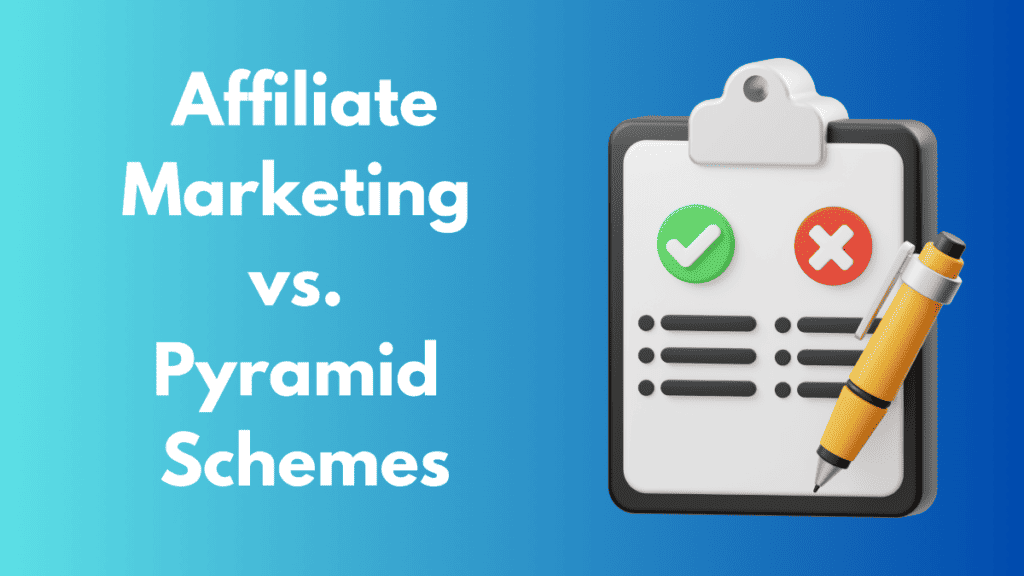
How Money is Made?
Affiliate Marketing: Here, it’s all about the hustle. Affiliates get their paycheck based on how well they promote and sell actual products or services. The equation is simple: better promotion equals better earnings.
Pyramid Schemes: On the flip side, pyramid schemes are all about the numbers game, but not in a good way. It’s less about selling and more about how many people you can get on board. The focus is on recruitment, and that’s where things get sketchy. This model is not only unsustainable but also illegal in many places.
What is Sold? Product? Service?
Affiliate Marketing: It’s genuine and transparent. Every affiliate is backing a real product or service, aiming to get it in the hands of customers who’ll benefit from it.
Pyramid Schemes: Here’s where the red flags pop up. There’s no real product or service in the spotlight. Instead, the money flows from roping in new members, not from genuine sales. It’s a shaky foundation that’s bound to crumble.
Structure of Operation
Affiliate Marketing: It’s all about individual hustle. Each affiliate is their own boss, working solo to promote products and rake in those commissions. No levels, no hierarchy, just direct results from direct efforts.
Pyramid Schemes: This is where the layers stack up. It’s a tiered system, where the focus is on getting more people in to pay the ones who came before. It’s like a house of cards, relying on constant new additions to stay standing.
Legality
Affiliate Marketing: It’s on the up and up! This model is legit, accepted, and even has regulations in place in numerous countries to ensure fair play.
Pyramid Schemes: Red flags everywhere! These schemes are outlawed in a lot of places because they’re deceptive and can leave folks with empty pockets. Always a no-go.
Long-term Sustainability
Affiliate Marketing: It’s built to last! As long as there are valuable products or services that consumers want, this model keeps on ticking.
Pyramid Schemes: It’s like building a house on sand. The moment the recruitment game slows down, everything comes tumbling down. Not a long-term plan, and definitely not a safe one.
Transparency
Affiliate Marketing: Everything’s out in the open. You know what you’re promoting, how much you’ll earn, and the rules of the game.
Pyramid Schemes: It’s like trying to navigate through fog. They’re often hush-hush about real earnings and the risks you’re taking on. Not a straightforward deal, that’s for sure.
Is Affiliate Marketing a Pyramid Scheme?
Alright, let’s get one thing straight off the bat: affiliate marketing is NOT a pyramid scheme. I get it, the online world can be a maze, and it’s easy to get things mixed up. But these two? They’re as different as apples and oranges. Let’s break it down:
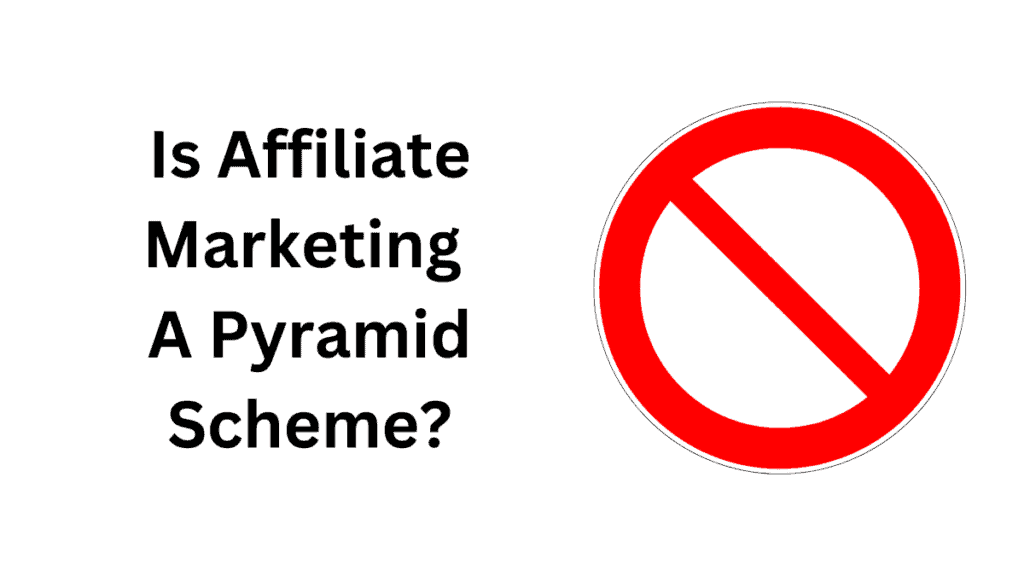
Zero Entry Barriers:
- Affiliate Marketing: Jump right in! There’s no ticket to buy or door fee. Just pick a product, promote it, and you’re good to go.
- Pyramid Schemes: They’ll ask for a “small” upfront fee. That’s how the big fish at the top reel in their cash.
It’s All About Value:
- Affiliate Marketing: You’re the bridge between genuine products and the folks who might benefit from them.
- Pyramid Schemes: It’s all smoke and mirrors. They’re more about getting new recruits than offering real value.
Clear-Cut Earnings:
- Affiliate Marketing: You know the deal. Promote a product, make a sale, earn a commission. Simple.
- Pyramid Schemes: It’s all hazy. Money’s coming in, but where’s it really from? Mostly from new recruits.
No “Recruit to Earn” Nonsense:
- Affiliate Marketing: Your earnings come from your hustle in promoting products, not from getting your pals to join.
- Pyramid Schemes: It’s all about getting more folks on board. The more you recruit, the more you “earn”.
On the Right Side of the Law:
- Affiliate Marketing: It’s all legit. A recognized and above-board way to do business.
- Pyramid Schemes: Many countries have passed laws saying that pyramid schemes are illegal. They’re shady and full of risks.
Fly Solo:
- Affiliate Marketing: You’re the captain of your ship. Decide what to promote and how to do it.
- Pyramid Schemes: They often have a set script you need to follow, pushing you to recruit and “invest” more.
Show Me the Money!:
- Affiliate Marketing: You can track every penny back to the effort you put in.
- Pyramid Schemes: It’s a tangled web. Hard to figure out where the money’s coming from or going.
So, there you have it. Affiliate marketing is a genuine way to earn money by connecting products with people.
Pyramid schemes? They’re all about recruitment, often leaving folks at the bottom out of pocket.
If you’re looking to dive into the online money-making world, know the difference, and make informed choices.
Navigating the Waters: How to Avoid Affiliate Marketing Scams
While affiliate marketing is a legitimate business, like any industry, it has its share of scams. Here are some guidelines to help you steer clear of them:

A. Research Before You Join:
Thinking of joining an affiliate program? Don’t just jump in. Check out reviews, ask around, and give those terms and conditions a good read.
B. Avoid Upfront Fees:
Red flag alert! If they’re asking for money to let you in, it’s time to walk away. The real deal won’t charge you to join.
C. Look for Real Products or Services:
Make sure there’s an actual product or service in the mix. No product? Could be a scam.
D. Understand the Commission Structure:
Get the lowdown on how and when you’ll get paid. Clear commission details are a must.
E. Be Wary of Overhyped Earnings Claims:
Big promises of crazy earnings? Take it with a pinch of salt. If it sounds like a fairy tale, it might just be one.
F. Use Reputable Affiliate Networks:
Go with trusted affiliate networks. They do the background checks on affiliate programs, so you don’t have to.
G. Continual Learning and Networking:
The affiliate marketing scene is always buzzing. Stay in the loop, and chat with fellow affiliates to get the inside scoop.
H. Report Scams:
If you stumble upon something fishy, shout it from the rooftops. Reporting scams and affiliate frauds helps keep things clean for everyone.
There you have it! Keep these tips in your back pocket, and you’ll be all set to make the most of affiliate marketing. Dive in, stay savvy, and happy promoting!
Conclusion
Affiliate marketing is brimming with opportunities for individuals and businesses alike. It’s a tried and tested model.
If you are wondering – is affiliate marketing legit?
The answer is YES!
It is a completely transparent & legal business model. Affiliate marketing is not a pyramid scheme, and here’s a recap of why:
- Value Delivery: At its core, affiliate marketing is about promoting real products or services. When someone buys through your recommendation, you earn a commission. It’s straightforward and beneficial for everyone.
- No Recruitment Needed: You’re focusing on promoting products, not trying to get people to join some hierarchy.
- Transparent Earnings: With affiliate marketing, the commission structure is clear. You know beforehand what you’ll earn from each sale.
- Legitimate and Regulated: Affiliate marketing operates within a framework of regulations, ensuring it’s above board. On the contrary, pyramid schemes often bypass laws, making them illegal.
- Independence in Operations: In affiliate marketing, you choose which products you want to endorse. There’s no external pressure.
- Long-term Sustainability: Affiliate marketing thrives on actual sales and satisfied customers, making it a long-term, sustainable model.
While there are misleading practices out there, by sticking to reputable sources and being cautious, you can navigate the world of affiliate marketing effectively.
In summary, as you venture into affiliate marketing, remember to gather reliable information, align with well-established programs, and always be on the lookout for anything that doesn’t seem right. It’s a fantastic way to earn commissions ethically and sustainably. Good luck!
Frequently Asked Questions about Affiliate Marketing
Is affiliate marketing legitimate?
Absolutely! Affiliate marketing is a legitimate and widely recognized business model within the digital marketing sphere. It operates on a performance-based marketing principle where individuals, known as affiliates, promote products or services for businesses, and earn a commission for every sale, click, or lead generated through their marketing efforts. Many reputable companies have affiliate programs, including Amazon, eBay, and Shopify, which further solidifies its legitimacy in the online business world.
Can I make money with affiliate marketing?
Yes, you can make money with affiliate marketing, provided you apply the right strategies and are willing to put in the effort. Success in affiliate marketing requires understanding the needs of your audience, promoting products or services that solve their problems, and leveraging effective marketing channels to reach them. Many affiliate marketers make a substantial income by promoting products and services online, but it’s important to note that success doesn’t happen overnight. Continuous learning, patience, and persistent effort are key to achieving financial goals through affiliate marketing.
How do I avoid affiliate marketing scams?
Avoiding common affiliate marketing scams requires a vigilant approach. Here are a few steps you can take:
Research: Before joining an affiliate program, thoroughly research the company to ensure its legitimacy. Look for reviews, testimonials, and any red flags online.
Avoid Upfront Fees: Legitimate affiliate programs usually do not require you to pay a fee to join. Be wary of programs that ask for an upfront payment.
Transparency: Look for programs that have clear terms and conditions, and transparent commission structures.
Support: A good affiliate program should offer support and training to its affiliates. Lack of support may be a red flag.
Check Regulatory Websites: Verify the legitimacy of the affiliate program on regulatory websites or industry watchdogs to ensure they operate within legal bounds.






